Artificial intelligence has made rapid progress since its inception, with not only professional factors but also satisfying your personal needs. You can find a lot of AI facilities that you can use in your leisure for various kinds of entertainment, such as the conversational AI functions we can mostly carry in our devices.
Nonetheless, when we talk about conversational AI, we might indicate several AI assistants such as Google Gemini, ChatGPT, Perplexity, and many more. However, your basic conversational AI functions more in a personal way with natural language. With these facilities, you can leverage both text and voice conversations with a proper context.
In this blog, we will talk about the top 10 conversational AI assistants you can find, alongside various other benefits you can get from these facilities.
What Are Conversational AI Agents?
You can refer to conversational AI agents primarily as digital programs for performing basic and contextual conversations through both text and voice. These AI facilities will strike a conversation with you with a more human-like approach by implementing the Natural Language Understanding (NLU).
Moreover, these AI programs use various facilities for operations such as conversation management, speech recognition, ML (Machine Learning), NLP (Natural Language Processing), and many more. Nonetheless, here are various types of these AI agents you can follow:
- Chatbots: These are mainly text-driven facilities you can find on apps, websites, and messaging platforms.
- Voice Assistants: Familiar voice assistants in your device, like Apple Siri, Google Gemini, Amazon Alexa, etc.
- AI Organizations: Proficient and sometimes emotionally responsive agents like the Replica.
- VCAs (Virtual Customer Assistance): These facilities are efficient AI bots for client assistance and sometimes integrate with the CRM systems.
How Do Conversational AI Agents Work?
The conversational AI programs function in several ways by incorporating various technologies that can activate them to understand, respond, and process your conversational language in a natural way. Moreover, here are some ways these conversational AI agents function:
As conversational AI agents become more sophisticated, distinguishing between human and AI-generated interactions is increasingly important. An ai detector can assist in identifying AI-generated text, helping ensure authenticity and transparency in digital communications.
Input Processing
You can type texts through chat interfaces, and for voice input, while speaking, the AI agent implements the ASR (Automatic Speech Recognition) facility to convert your speech to text.
Conversation Management
This function generally maintains the context of your conversation throughout the entire process. Moreover, this facility mainly operates by relying on several functions such as the current intent, business workflows or logic, and previous messages.
Output Delivery
The AI agents can send text responses through the conversation interface and manage voice responses by converting the text back into speech by implementing the TTS (Text-to-Speech) technology.
Optimization And Learning
ML or Machine Learning allows the AI agents to optimize their functions over time by assessing several factors, such as:
- Inspecting the failure and success rates.
- Learning from user interactions.
- Improving models with modern data.
Benefits of Conversational AI Agents
There are a variety of benefits you can leverage from the AI agents across several companies and user cases. Nonetheless, here are some benefits of AI agents you can refer to:
All-time Functionality
The AI agents are always online to engage in a conversation with you without taking a break for holidays or time zones. They also ensure that you get the proper solution you are looking for at your leisure.
Direct Responses
The AI programs can deliver real-time solutions to your queries by removing the waiting procedure. Moreover, they can also greatly optimize user satisfaction and your professional proficiency.
Scalability
The agents can maintain a lot of your conversations simultaneously, unlike the human agents, who would have to maintain the scale linearly with proper appeals.
Cost-Effective
The AI agents can also be a budget-friendly option for you to get service groups and larger assistance. These agents can also reduce the functional costs without eliminating the operation quality.
Customization
These facilities can craft their responses relying on various factors such as your choices, data, and previous interactions. Moreover, they can also make the conversation feel more pertinent and engaging to you.
Top 10 Conversational AI Agents And Platforms in 2025
AI agents and platforms can provide you with a lot of benefits, as we have mentioned throughout our article. Also, their features mainly depend on what kind of AI platform or agent you are using. Nonetheless, here are some prominent examples of top AI agents and platforms you can follow:
1. IBM Watson Assistant

At the top of our list for AI agent preference, the IBM Watson Assistant is an ideal choice for finding a suitable conversational AI agent. The facility is mainly ideal for enterprise-level virtual assistants who are popular for their enhanced AI functions and integration adaptability.
This AI agent is mainly popular for its advanced features and reliance on enterprise facilities. Moreover, this facility is an integral part of IBM’s larger generative AI platform and aims to create AI chatbots and virtual agents that allow you to interact with natural language across different channels.
Key Features
- It can detect user intent, recognize entities, and address irrelevant problems while also offering auto-corrections for grammatical errors.
- It can learn from previous conversations and optimize its response precision over time.
- The AI agent is deployable through several facilities like SMS, voice, and web chat.
Pros And Cons
Pros
- It is efficient for comprehending contextual nuances, intent detection, and extracting entities.
- It can activate flawless deployment across various social media platforms, SMS, webchat, etc.
- The facility also provides you with strong data privacy regulations, encrypted conversations, and multiple compliance features like HIPAA support.
Cons
- The Lite subscription has various feature restrictions for users.
- The advanced features may feature to have a robust and complex technical proficiency.
- There are various reports on inconsistent sentiment detection and classification in concurrent testing.
Ratings
- Capterra: 4.4/5.
Pricing
- $140 per month.
Website: https://www.ibm.com/products/watsonx-assistant
2. Amazon Lex
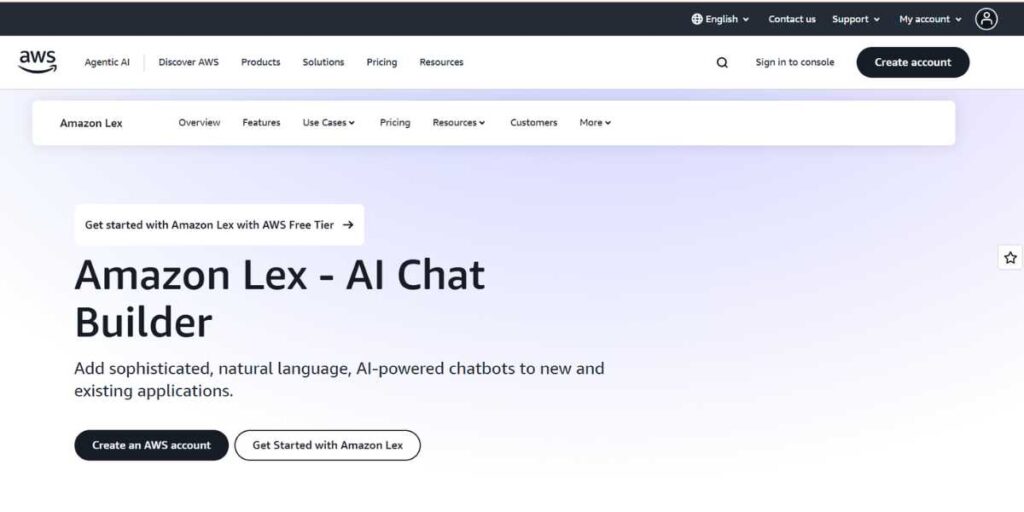
At our second position, we have the Amazon Lex AI facility, which you can refer to as one of the best AI agent platforms in the market. Alongside various AI facilities of Amazon, this AI service also allows you to create conversational interfaces by implementing both text and voice during your conversation.
This facility also provides similar ASR (Automatic Speech Recognition) and NLU (Natural Language Understanding), which you can find in different AI agents that power the Alexa voice assistant to any application without requiring any in-depth machine learning proficiency.
The AI program mainly regulates various factors like communication flows, intents, and conversations by your definition of intents and utterances through a console.
Key Features
- It has in-built NLU and ASR functions that activate the voice and text input interactions to comprehend the user intent.
- It supports cross-step dialogues with various prompts and context regulations across several turns.
- The facility has a drag-and-drop interface for visualizing and designing the conversation flows.
Pros And Cons
Pros
- It has flawless AWS ecosystem integration with various services like Lambda, S3, DynamoDB, Polly, and Kendra.
- You can publish bots across various facilities such as smartphones, web, Facebook Messenger, and many more.
- It has an in-built observation and analytics system.
Cons
- The web integration function is complex for a lot of users.
- There is restricted non-English and multilingual assistance for users.
- It heavily relies on the AWS ecosystem for operation.
Ratings
- Gartner: 4.4/5.
- TrustRadius: 7.4/10.
Pricing
- $0.00075 for each text request.
Website: https://aws.amazon.com/lex/
3. Google Dialogflow
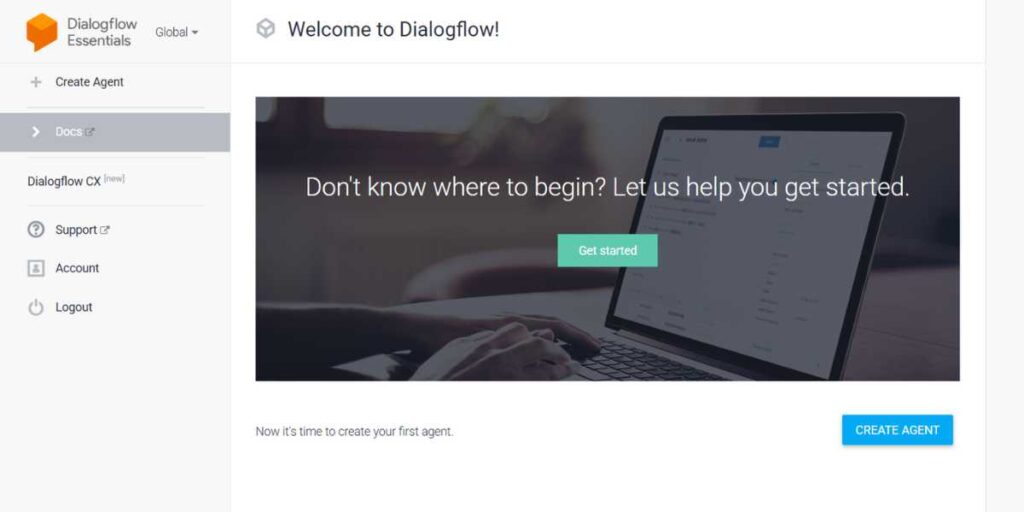
Coming up next, we can suggest the Google Dialogflow AI assistance as a reliable source for engaging in a natural conversation. Moreover, this AI facility is mainly familiar to you as API.AI as a communication platform within the Google ecosystem.
This facility activates various businesses and developers to create authentic and rich-language interfaces for several factors, such as voice assistants, IVR systems, chatbots, different channels, and many more. Nonetheless, this AI platform primarily provides you with two major frameworks that are Dialogflow ES (Essentials) and Dialogflow CX (Conversational Agents).
Key Features
- It is prominent in multiple abilities like intent recognition, entity extraction, contextual conversational management, and many more.
- It uses various dynamic components such as pictures, cards, and buttons while also integrating with backend systems through webhooks.
- The platform can effortlessly connect with multiple facilities like Google Assistant, Firebase, Cloud Functions, etc.
Pros And Cons
Pros
- There is cross-platform and channel integration with multiple facilities.
- The platform also offers multilingual and localization capabilities that support more than 20 to 30 languages.
- It has a user-friendly interface with several development tools.
Cons
- Even though the entry-level cost is affordable but the eventual expenses can increase drastically for users.
- There are restricted personalization or customization facilities in this platform.
- It has a complex learning curve that requires extensive technical proficiency.
Ratings
- Gartner: 4.5/5.
Pricing
- $0.012 per text request.
- $0.002 per voice text.
Website: https://dialogflow.cloud.google.com
4. ChatGPT
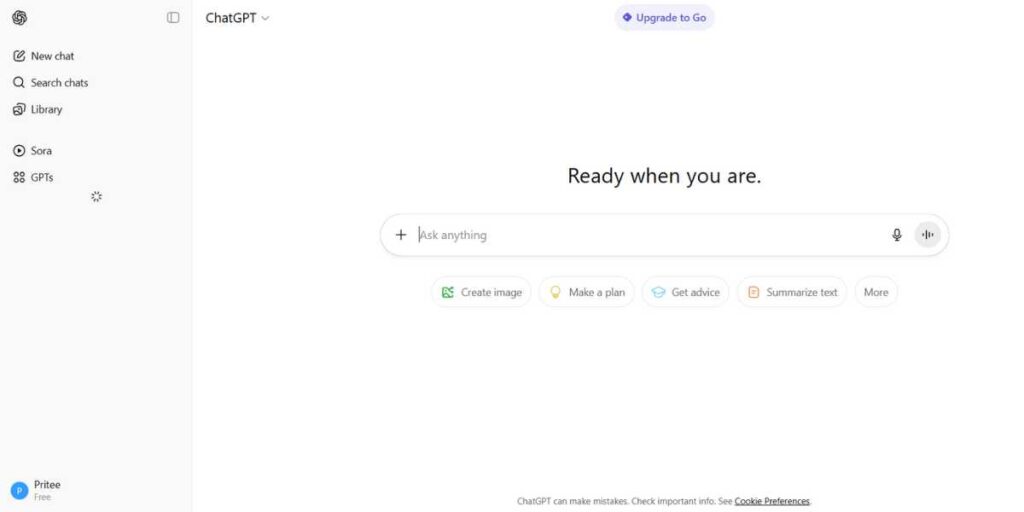
There is another mention we can recommend to you, which is very familiar and highly popular among one of the best AI agents and platforms, and that is the ChatGPT facility. Judging from current usage, the ChatGPT programme has become so popular that it has even left behind various search engines in terms of utility.
It is mainly a conversational interface which operates on the GPT-4o facility and is capable of various functions such as natural conversations, data analysis, picture comprehension, voice interaction, code generation, and many more. Moreover, it can also address your daily inquiries that range from personal to educational problems.
Key Features
- It has an in-depth contextual awareness while being fluent in creative responses.
- The program can comprehend voice, texts, and pictures while responding in multiple formats.
- It can execute code, calls, and implement many external tools.
Pros And Cons
Pros
- It has exceptional natural language generation and comprehension abilities.
- You can find a lot of multi-modal functions with the pro version.
- This facility supports over 50 programming languages and incorporates developer workflows.
Cons
- You may face various inaccurate responses to your queries.
- There are restricted personalization options with the free version.
- It lacks concurrent texaul memory for all users.
Ratings
- Capterra: 4.5/5.
Pricing
- $22.86 per month.
Website: https://chatgpt.com
5. Microsoft Azure

Another prominent reference of an ideal conversational AI agent or platform might refer to Microsoft Azure, developed by the Microsoft ecosystem. The platform is generally ideal for creating, deploying, and regulating the intelligent bots across various channels like smartphones, web, Teams, etc.
You can also find a low-code visual interface in the Microsoft Copilot Studio for instant bot development, which is also ideal for non-technical users. Moreover, you can also integrate this facility with bot orchestration and multiple development facilities like the Bot Framework.
Key Features
- It supports multiple channels web chat, email, SMS, telephony, Teams, and many more.
- You can deeply customize with code when you need it.
- There are advanced generative models and concurrent voice-activated communications with the GPT-4o ecosystem.
Pros And Cons
Pros
- It can effortlessly integrate with the Microsoft ecosystem facilities like Office 365, Dynamics 365, Windows, etc.
- It has an enterprise-ready cloud infrastructure.
- It can offer a variety of services for databases, networking, storage, etc.
Cons
- The user interface of this AI platform is very inconsistent for many people.
- The AI services may vary depending on your region.
- The facility is less open-source-friendly in terms of services.
Ratings
- Capterra: 4.6/5.
- Gartner: 4.5/5.
Pricing
- VM hourly usage: $0.0198.
Website: https://azure.microsoft.com/en-in
6. Haptik
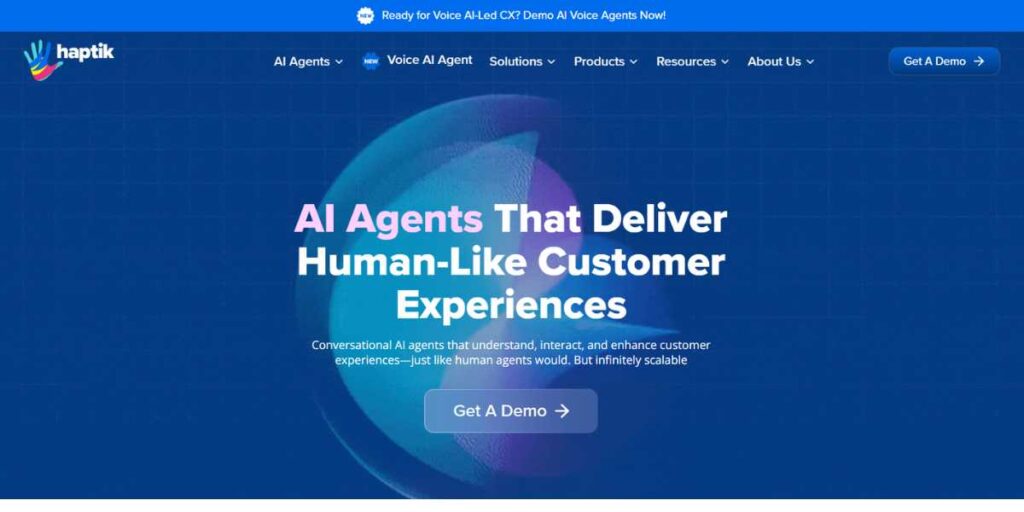
There are a lot of conversational AI agents and platforms you can find on the internet, and one of them is the Haptik facility. It is mainly an India-based facility, currently managed by Reliance Jio with its various AI features. This facility mainly encourages enterprises and organisations to create AI-driven visual assistants and chatbots.
Moreover, these AI chatbots and virtual assistants are ideal for comprehending the natural language, across speech and text in your conversations. Also, this facility is functional across various industries such as finance, telecom, e-commerce, and healthcare.
Key Features
- You can experiment with multiple AI models like LLaMA, GPT, Claude, etc.
- You can deploy the AI platform across multiple channels such as web, SMS, Facebook, WhatsApp, and many more.
- It is mainly ideal for enterprise usage for their business operations.
Pros And Cons
Pros
- You do not require any coding knowledge to operate on this platform.
- You will find various industry-specific templates for e-commerce, telecom, and insurance. And banking.
- It has various rich analytics and reporting functions.
Cons
- The AI platforms are budget-friendly for many businesses.
- You will face complexity with open-ended user inputs.
- You might also experience delays with the customer service.
Ratings
- Glassdoor: 4.1/5.
- Gartner: 4.5/5.
Pricing
- $5000 per year.
Website: https://www.haptik.ai
7. Kore.ai
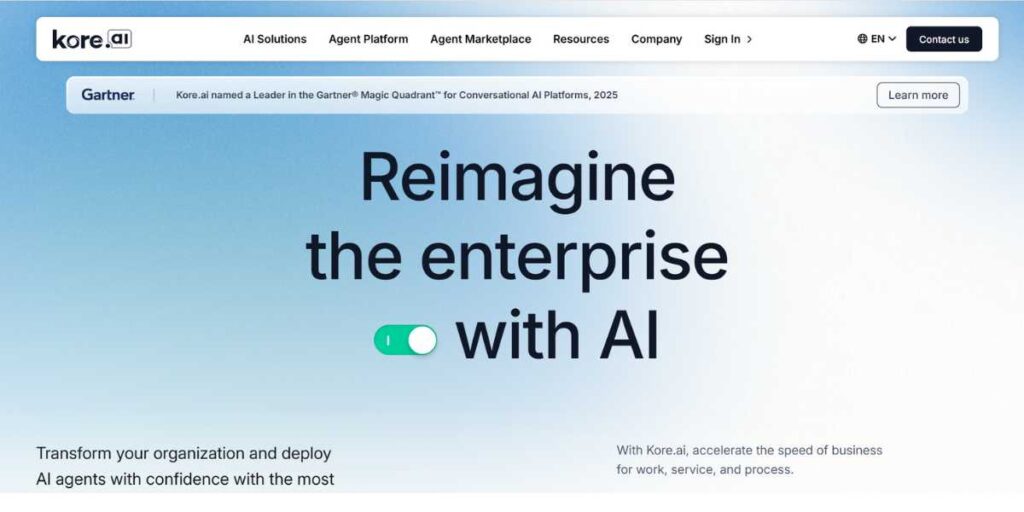
Coming up next, there is another major reference to a highly reliable conversational AI agent, which is Kore.ai. It had a previous name, called Kore, Inc., and also functions as an efficient enterprise-level conversational AI platform that assists companies in deploying, creating, and maintaining their intelligent virtual assistants.
Moreover, their virtual assistants operate across various professions like employee, and customers, alongside several contact center user cases. This facility is ideal for various functions such as complex tasks and scalable AI solutions with enhanced compliance, security, and orchestration facilities.
Key Features
- The platform provides various low-code, no-code, and pro-code facilities, which are ideal for multiple user types.
- Its conversational intelligence implements conventional models and LLMs for delivering empathetic and context-aware responses.
- It can deploy across over 35 digital and voice channels.
Pros And Cons
Pros
- You can find flexible development options for various operations.
- It is generally generative AI-ready with facilities like dialog agents, GALE, etc.
- This platform operates at an enterprise level with functions such as security, compliance, analytics, and many more.
Cons
- You might find the customization options highly complex.
- The platform is budget-friendly for many enterprises.
- You may find it difficult to use the advanced features.
Ratings
- Capterra: 4.4/5.
- G2: 4.7/5.
Pricing
- $300,000 per annum.
Website: https://kore.ai
8. Cognigy
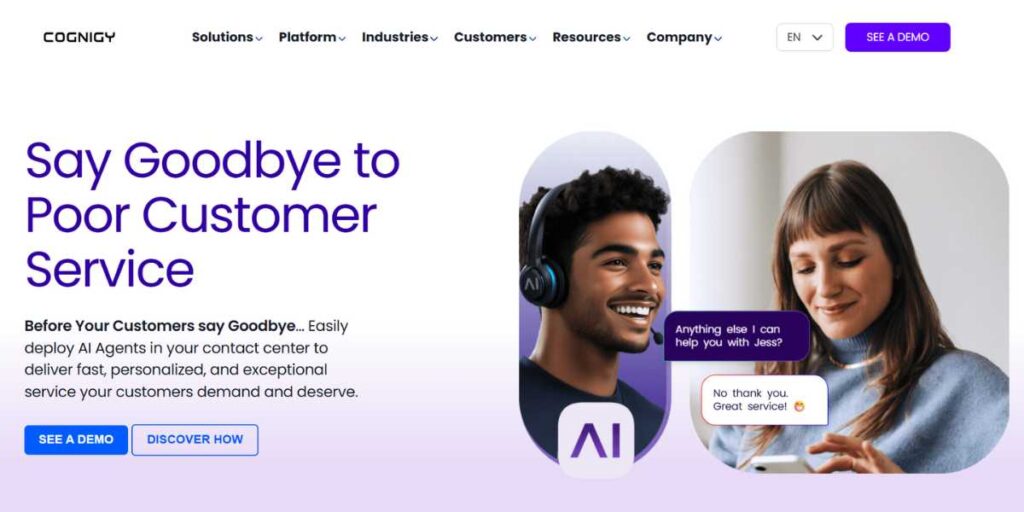
Among our various mentions for top conversational AI agents and platforms, you can also use the Cognigy AI facility as a reliable chat assistant. You can mainly refer to it as a leading enterprise-grade conversational AI program, which is ideal for managing, deploying, and building AI agents for both chat and voice functions.
This AI program primarily blends generative AI with deterministic logic for delivering context-aware, sophisticated, and scalable agentic workflows. Moreover, it has a Nexus Engine facility, which is effective for context-aware, goal-driven reasoning and automation.
Key Features
- It can develop AI agents that can leverage concurrent memory, generative AI, and incorporate tooling for human-like communications.
- It has a low-code flow editor, which is ideal for designing complex communications.
- The platform is enterprise-ready, which is scalable across more than 25,000 real-time interactions.
Pros And Cons
Pros
- The facility is mainly ideal for high-demand environments.
- The platform supports more than 100 languages.
- You can flawlessly integrate facilities like Microsoft Teams, Salesforce, and ServiceNow.
Cons
- As you can leverage robust flexibility on this platform, you might feel overwhelmed by the features.
- It requires a lot of resources to run its operations.
- You can also find various documentation and feature discovery features in this facility.
Ratings
- Gartner; 4.8/5.
- G2: 4.6/5.
Pricing
- $115,000 per year.
Website: https://www.cognigy.com
9. Leena AI
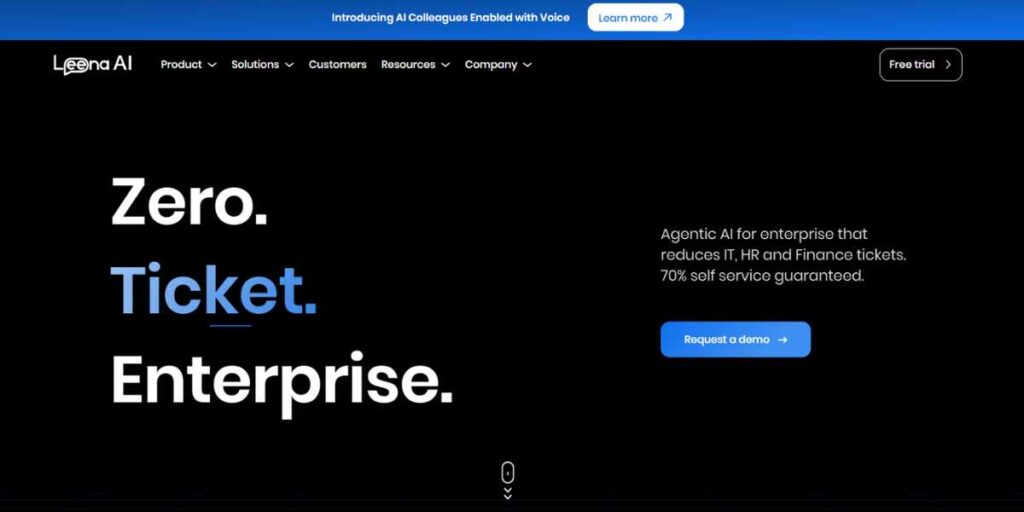
There are numerous functional conversational AI agents you can find on the internet, but only a few of them are reliable. However, one such AI assistant you can rely on is the Leena AI, which is one of the best conversational AI platforms and agents. Moreover, you can mainly refer to it as a US-based enterprise SaaS platform, located in New York.
This facility primarily functions as an autonomous conversational AI program for streamlining employee assistance across various departments, such as IT, HR, Finance, and many more, while supporting over 100 languages.
Key Features
- It can offer enterprise-level efficiency and automation services.
- The facility can incorporate more than 1000 enterprise systems, such as ADP, Workday, SAP, etc.
- It can consolidate enterprise data for accurate and customized responses.
Pros And Cons
Pros
- It can streamline HR automation and offer 24/7 support.
- You can find various automation and personalized workflow abilities.
- There are also robust analytics and data insights available on this platform.
Cons
- The platform features a lengthy setup procedure.
- There are various customization restrictions and UX constraints.
- It relies heavily on high-quality data.
Ratings
- Gartner: 4.5/5.
- Capterra: 4.5/5.
Pricing
- Publicly unavailable.
Website: https://leena.ai
10. Yellow.ai
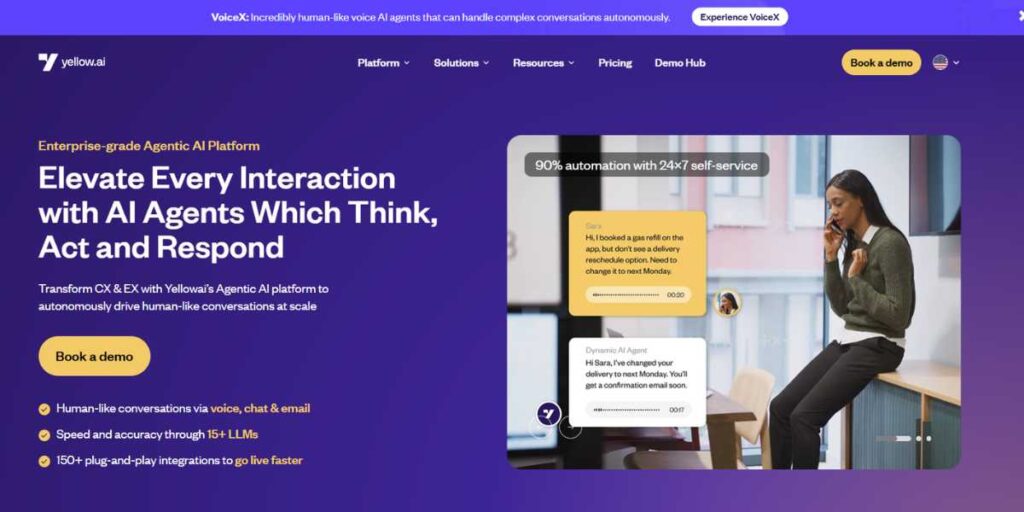
At the end of our list, we can recommend Yellow.ai as a reliable conversational AI agent, which had a former name called Messenger. It is mainly a conversational CX automation and AI platform that operates on a global scale. Moreover, this facility is ideal for automating customer services across chats, voice, emails, and many more.
Key Features
- This is mainly an agentic AI with dynamic automation capabilities.
- It can employ various cross-LLM setups like Claude 3, GPT-4, DeepSeek, etc.
- The platform also delivers flawless assistance over 40 channels.
Pros And Cons
Pros
- It can provide highly human-like conversation facilities with Generative AI.
- It can rapidly deploy with various pre-built templates.
- There is extensive multilingual and omnichannel support.
Cons
- The advanced personalization features may seem overwhelming to many users.
- You might face various integration difficulties.
Ratings
- Capterra: 4.5/5.
- Gartner: 3.7/5.
Pricing
- $100 per month.
Website: https://yellow.ai
Challenges And Limitations
There are various restrictions and challenges you can face with these conversational AI agents, such as:
- Understanding natural language inaccurately, as they are often vague, idiomatic, and context-dependent.
- Several conversational AI agents may struggle with keeping the context accurate for long conversations.
- The AI facilities also face difficulties while managing unexpected inputs, such as off-topic and irrelevant
- There are also various privacy and security concerns, such as data sensitivity and user trust.
How to Get Started with Conventional AI Agents?
You can initiate with conversational AI agents in various ways. For instance, you can refer to:
- Defining your objective and user cases.
- Choosing the ideal platforms or tools, such as Dialogflow, Amazon Lex, ChatGPT, etc.
- Designing the conversation flows with tools like Botmock, VoiceFlow, Miro, and many more.
- Building various NLP capabilities, such as adding synonyms and tagging key data.
- Integrating with backend systems by fetching data from CRM, processing orders, and sending alerts or emails.
In Conclusion
Conversational AI Agents and platforms are a great way to spend our free time with multiple entertainment facilities they can offer us. Moreover, they are operable for meeting several industrial expectations for many enterprise-grade operations. However, we should also not forget the harmful effects of these AI facilities by engaging with them personally, and we must always maintain a safe distance from them.
FAQs
1. How do you define a conversational AI?
– You can mainly define a conversational AI as a digital function that implements natural language to communicate with users through texts or voices.
2. What are the differences between conversational AI and chatbots?
– The conversational AIs generally use machine learning and NLP for flexible conversations, while chatbots sometimes respond to predefined inputs.
3. How can a conversational AI understand the user context?
– A conversational AI typically understands the user context by various factors such as detecting user intent, extracting entities, and responding appropriately through Natural Language Processing (NLP).
4. Where are some reliable platforms that create conversational AI agents?
– Some of the efficient platforms to create conversational AI agents are OpenAI ChatGPT, Google Dialogflow, Amazon Lex, IBM Watson Assistant, and many more.
